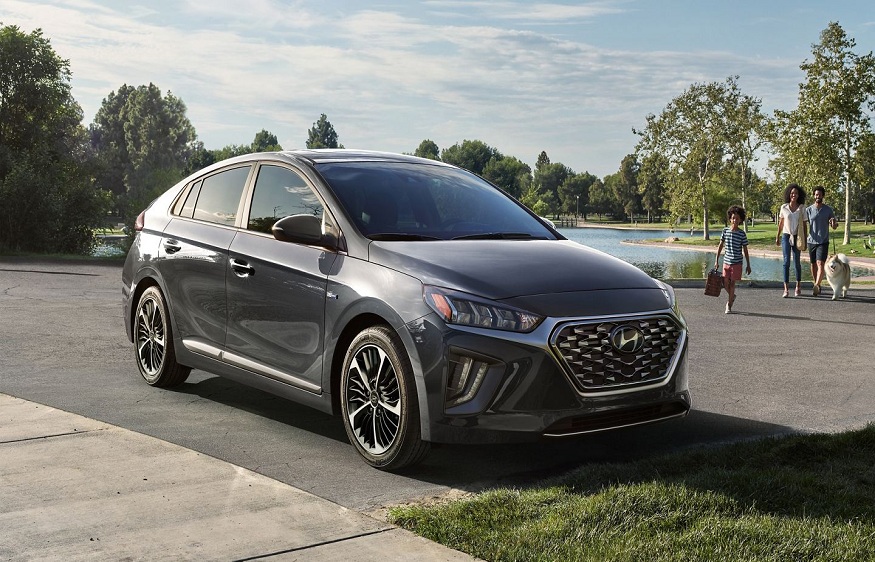Thanks to its aggressive pricing, the Ioniq PHEV is by far the cheapest plug-in on the market.
Hyundai today launches the commercialization of the Ioniq Plug-In Hybrid (PHEV). The brand is thus expanding its Ioniq range with a variant that combines the advantages of a hybrid engine with those of a fully electric vehicle.
In concrete terms, the plug-in hybrid version combines the comfort, pleasure and quiet operation of an electric car with the range of a hybrid power train. It can also count on particularly low CO2 emissions, which allows it to be fiscally attractive for both individuals and corporate fleets. Like all Hyundais, this new Ioniq also benefits from particularly complete basic equipment for a very competitive price.
Advantages of plug-in technology
Technologically, the main difference between the hybrid version of the Ioniq (HEV) and the Ioniq Plug-In Hybrid is its larger battery capacity of 8.90 kWh (instead of 1.56 kWh). The new Ioniq PHEV delivers an electrical power of 44.5 kW (or 60.5 hp), which allows it to cover a maximum distance of 63 kilometers in autonomous mode.
And logically, thanks to this autonomy without the slightest emission, the normalized consumption of this variant is particularly low: 1.1 litres/100 km. With its corresponding CO2 emissions of only 26 g/km, the Ioniq Plug-In Hybrid is also particularly tax-efficient, whether for private individuals or companies.
In practice, the Ioniq PHEV automatically switches between hybrid and electric mode depending on parameters such as driving style and battery charge. Drivers can also opt for a specific mode, for example to preserve their electric range or drive without emissions in areas where this mode is mandatory or desired.
The battery recharging time being limited to approximately 2 hours and 15 minutes via a conventional socket, ultra-fast charging is not provided for this version.
Vast autonomy
In addition to its electric power train, the Ioniq Plug-In Hybrid can count on the same 1.6 petrol engine as the hybrid version. Both variants also boast the same system output of 104 kW (or 141 hp). And logically, their performance is also similar. The big difference is in the overall range, which for the PHEV reaches no less than 1,100 kilometers.
Same equipment as the electric Ioniq
In terms of its equipment, the Ioniq PHEV is closer to the 100% electric Ioniq. The Plug-In version is also based on 16-inch wheels. It also benefits from LED lighting and steering wheel paddles. The boot floor is raised slightly, with the battery housed under the rear seats and the cargo area. It also takes over from the EV version the various ‘electric’ navigation functions: display of electric range, search function for a charging station, indication of charging time and programming of recharging.
The Plug-In Hybrid version is also equipped with the ECO-DAS system (Eco-Driving-Assistant System). This system analyzes the route programmed in the navigation system in order to anticipate slowdowns, which helps to reduce fuel consumption and increase driving comfort. This device is also accompanied by a predictive energy management system, which charges or discharges the battery when approaching a hill in order to be able to use it optimally. To be able to use the ECO-DAS system, the driver must have programmed a destination and be driving in ECO mode at a speed of between 40 and 160 km/h.
A contained price, an extended warranty
Like the other Ioniq models already on the market, the new Ioniq Plug-In Hybrid is also available in two levels of equipment: Premium and Executive, the only option being metallic paint. The base price for the Premium execution is 33,999 euros (VAT). As a result, the Ioniq Plug-in Hybrid is by far the most affordable plug-in hybrid on the market. Other competitors are not only more expensive, but generally have significantly less electric range.
As for the Executive version styling the range, benefiting in particular from leather upholstery, it costs 36,999 euros (VAT).
Like other ioniq variants, the Plug-In Hybrid version comes with a 5-year comprehensive warranty and an 8-year battery warranty. The first copies of the Ioniq Plug-In Hybrid will be available from distributors this month.

